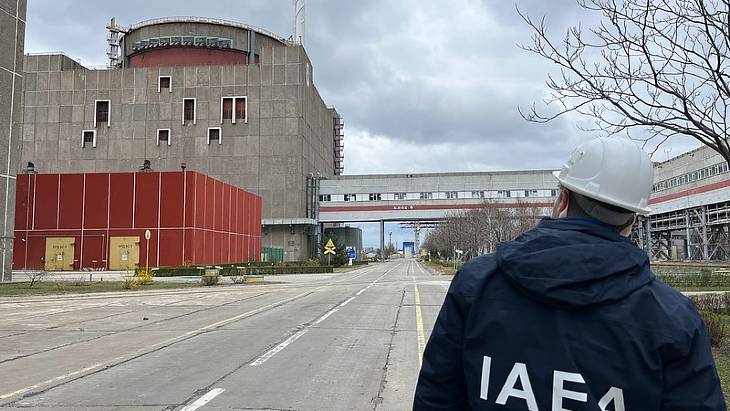 IAEA experts have been at the site since last September (Image: IAEA)
IAEA experts have been at the site since last September (Image: IAEA)International Atomic Energy Agency (IAEA) Director General Rafael Mariano Grossi says that the agency's experts at the site have not observed any indications of mines or explosives at the Zaporizhzhia nuclear power plant, but says they have requested additional access, including to the rooftop of two reactors.
His comments came in an IAEA update as both Russia and Ukraine accuse the other side of preparing actions which will damage the largest nuclear power plant in Europe.
The IAEA "is aware of reports that mines and other explosives have been placed in and around" Zaporizhzhia nuclear power plant (ZNPP), but its experts stationed at the plant "have in recent days and weeks inspected parts of the facility - including some sections of the perimeter of the large cooling pond - and have also conducted regular walkdowns across the site, so far without observing any visible indications of mines or explosives".
Grossi said: "With military tension and activities increasing in the region where this major nuclear power plant is located, our experts must be able to verify the facts on the ground. Their independent and objective reporting would help clarify the current situation at the site, which is crucial at a time like this with unconfirmed allegations and counter allegations."
He said additional access had been requested to parts of the turbine halls, some parts of the cooling system at the plant, and access to the rooftops of reactor units 3 and 4, a request "necessary to confirm the absence of mines or explosives at the site".
The five basic principles for safety and security of the Ukrainian nuclear power plant, which has been under Russian military control since early Match 2022, are that there should be no attack on the site, no attack from the site and it should not be used as storage or a base for heavy weapons. The plant is on the frontline of Russian and Ukrainian forces, but Grossi said there had not been any recent shelling or explosions reported by the team at the site and "the military presence at the site appeared unchanged".
In a separate development, the main external power line to the plant was reconnected after being down for about 12 hours on Tuesday. It followed the restoration of the backup power line on 1 July after four months, which meant emergency diesel-fuelled generators were not needed to provide the power necessary for essential safety functions. Researched and written by World Nuclear News. Source: World Nuclear News
2023-07-06T13:01:00+05:30
